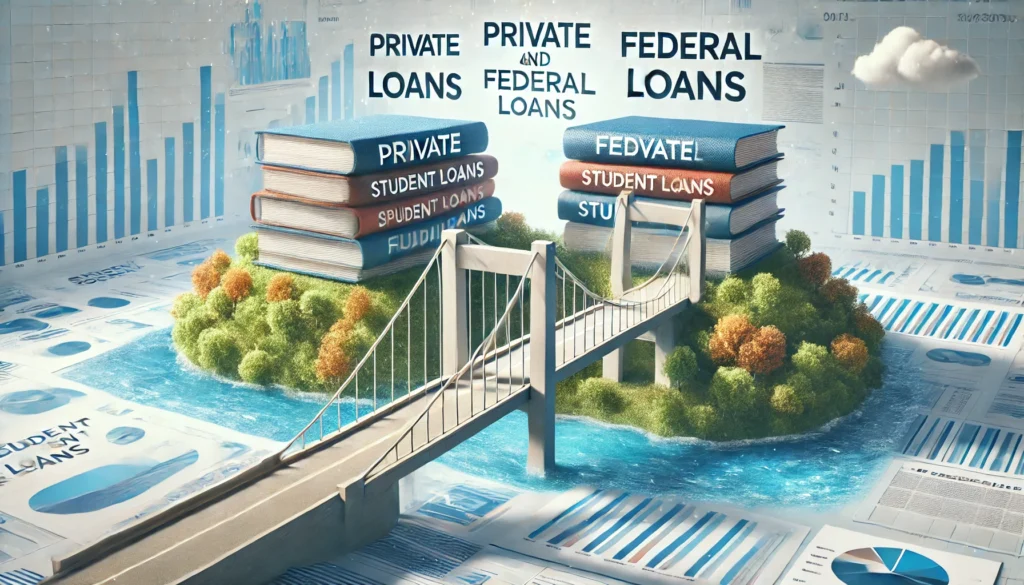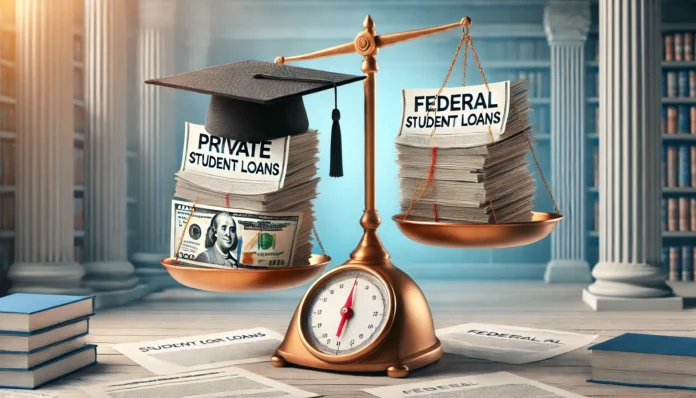Introduction: The Complexities of Student Loan Consolidation
Student loan debt is a significant financial burden for millions of borrowers, and managing multiple loans with different interest rates and repayment terms can be challenging. Many individuals seek ways to simplify their repayment strategy, often wondering, “Can you consolidate private and federal loans together?” The answer is more complex than a simple yes or no and depends on several factors, including the type of loan, lender policies, and long-term financial goals.
You may also like: Federal Direct Consolidation Loan: A Smart Strategy to Simplify Student Debt
Consolidating student loans can be an effective way to reduce monthly payments, secure lower interest rates, and simplify financial obligations. However, the process of combining private and federal student loans differs significantly from standard federal consolidation programs. Borrowers must weigh their options carefully, considering whether they should consolidate federal loans with private loans, refinance their existing student loans, or keep them separate to maintain federal benefits.
In this article, we explore the different ways borrowers can consolidate and refinance student loans, analyzing both private and federal options. By understanding the benefits, drawbacks, and long-term implications, borrowers can make informed decisions about their financial future.

Understanding the Basics of Student Loan Consolidation
Before deciding whether to consolidate private loans into federal loans or refinance existing student debt, it is essential to understand the fundamentals of student loan consolidation. Consolidation involves combining multiple student loans into a single loan with a unified interest rate and repayment plan. While this process can simplify debt management, not all consolidation options function the same way.
Federal Student Loan Consolidation
For borrowers with multiple federal student loans, the U.S. Department of Education offers the Direct Consolidation Loan program. This program allows borrowers to consolidate their federal loans into a single loan while maintaining access to benefits such as income-driven repayment plans, loan forgiveness programs, and deferment options. However, this program does not allow borrowers to consolidate federal loans with private loans—only federal loans are eligible for this type of consolidation.

Private Student Loan Consolidation
Unlike federal consolidation, private lenders offer consolidation options for both federal and private student loans through refinancing. Borrowers who choose to refinance their loans can combine multiple federal and private loans into one new private loan with different interest rates and terms. However, refinancing federal loans through a private lender means losing access to federal protections, such as Public Service Loan Forgiveness (PSLF), deferment, and income-driven repayment plans.

Can You Consolidate Private and Federal Student Loans Together?
A common question among borrowers is, “Can you consolidate private student loans with federal loans?” Unfortunately, the answer is no—there is no federal program that allows borrowers to combine both private and federal student loans into a single government-backed loan. However, private lenders offer refinancing options that allow borrowers to merge federal and private loans into a new private loan.
Refinancing through a private lender can offer benefits such as lower interest rates, reduced monthly payments, and improved loan terms. However, it comes with significant risks, primarily the loss of federal protections. Borrowers should carefully consider their eligibility for federal repayment assistance programs before moving forward with refinancing.
Should You Refinance or Consolidate Student Loans?
Borrowers often wonder whether they should refinance or consolidate student loans, particularly when managing both federal and private loans. Understanding the differences between these two processes is critical for making an informed decision.
Federal Loan Consolidation Benefits
- Maintains eligibility for federal repayment plans (e.g., Income-Based Repayment, Pay As You Earn).
- Keeps borrowers eligible for Public Service Loan Forgiveness (PSLF) and other federal benefits.
- Simplifies repayment by merging multiple federal loans into one.
Private Loan Refinancing Benefits
- Potential for lower interest rates, especially for borrowers with excellent credit and stable income.
- Can consolidate both federal and private student loans into a single loan.
- Allows borrowers to choose repayment terms that better align with their financial goals.
Ultimately, whether to refinance or consolidate student loans depends on individual financial circumstances, career plans, and risk tolerance.
Can You Refinance Private Student Loans to Federal?
Another common misconception is that borrowers can refinance private student loans to federal through federal consolidation. Unfortunately, federal programs do not allow for the conversion of private student loans into federal loans. Once a loan is issued by a private lender, it cannot be transferred to the federal student loan system.
However, borrowers may still benefit from refinancing their private student loans through another private lender. Many private lenders offer competitive refinancing rates that allow borrowers to lower their interest rates and reduce their total loan costs. Borrowers with strong credit scores and stable income may qualify for significantly lower rates through refinancing.
Factors to Consider Before Consolidating or Refinancing Student Loans
Before making a decision, borrowers should carefully weigh the pros and cons of refinancing or consolidating their student loans. Important considerations include:
- Interest Rates: Federal consolidation uses a weighted average of existing rates, while private refinancing may offer lower interest rates based on creditworthiness.
- Loan Protections: Federal consolidation retains borrower protections, whereas refinancing removes access to government-backed programs.
- Repayment Terms: Refinancing allows borrowers to choose new repayment terms, while federal consolidation generally offers fixed terms based on repayment programs.
- Eligibility for Forgiveness Programs: Borrowers pursuing Public Service Loan Forgiveness or other forgiveness programs should avoid refinancing federal loans with a private lender.
- Long-Term Financial Goals: Borrowers should consider how consolidation or refinancing aligns with their broader financial plans.
How to Qualify for Loan Consolidation for Private Loans
For borrowers interested in loan consolidation for private loans, eligibility requirements typically include:
- A strong credit score (often 650 or higher for the best rates).
- A stable source of income or a qualified co-signer.
- A low debt-to-income ratio.
- A history of on-time loan payments.
Meeting these criteria can increase the likelihood of securing favorable refinancing terms and maximizing savings.
Frequently Asked Questions (FAQ)
Can you consolidate private student loans with federal loans?
No, federal student loans and private student loans cannot be consolidated together into a single federal consolidation loan. Federal student loan consolidation is only available for federal loans, while private loans require refinancing through a private lender. However, some private lenders offer loan consolidation for private loans that may include federal loans, but doing so removes federal protections such as income-driven repayment plans and loan forgiveness options. If you are considering whether to consolidate private loans into federal loans, it’s important to note that federal consolidation does not accept private loans. Carefully weighing the benefits and drawbacks of keeping loans separate or refinancing is essential.
Can you consolidate private and federal loans together through refinancing?
While you cannot consolidate private and federal loans together through a federal Direct Consolidation Loan, refinancing through a private lender allows borrowers to combine both types of loans. Private refinancing can lower interest rates and simplify repayment, but it also removes federal protections like deferment, forbearance, and income-driven repayment plans. If you refinance private student loans to federal loans, you will lose access to federal benefits, making this a less favorable option for borrowers relying on government programs. However, refinancing can be beneficial for those who qualify for lower rates based on creditworthiness and financial stability. Understanding whether to refinance or consolidate student loans is crucial for long-term financial planning.
Can you consolidate private student loans with a federal program?
No, there is no federal program that allows borrowers to consolidate private student loans with federal loans. Federal student loan consolidation is designed exclusively for government-backed loans, meaning private student loans must be managed separately. However, private lenders do offer loan consolidation for private loans, which may help borrowers combine multiple private loans into one with a lower interest rate. If you’re wondering, “Can you consolidate private loans?” the answer depends on your lender’s policies and your financial qualifications. Refinancing remains the primary way to restructure private student loan debt.
What are the benefits of refinancing private student loans to federal loans?
Currently, you cannot refinance private student loans to federal loans, as the federal government does not offer refinancing options for private debt. This means borrowers with private student loans do not have access to federal benefits like Public Service Loan Forgiveness or income-driven repayment plans. However, refinancing private loans through private lenders can provide benefits such as lower interest rates, fixed repayment terms, and better monthly payment options. Understanding whether to refinance or consolidate student loans depends on individual financial goals, especially for borrowers seeking flexibility or cost savings. Exploring multiple lenders can help borrowers secure better refinancing terms.
How do you determine whether to refinance or consolidate student loans?
Deciding whether to refinance or consolidate student loans depends on your loan types, interest rates, and financial goals. If you have multiple federal loans, a federal student loan consolidation may simplify repayment and make you eligible for federal repayment programs. If you have private loans or a mix of private and federal loans, refinancing through a private lender may lower your interest rates and improve repayment terms. However, consolidating private loans into federal loans is not an option, meaning borrowers must choose between maintaining federal benefits or securing better private loan terms. Carefully evaluating interest rates, loan benefits, and financial flexibility is key to making an informed decision.
Can you consolidate private loans if you have a low credit score?
Yes, you can consolidate private loans even with a low credit score, but your interest rates may be higher compared to borrowers with strong credit profiles. Some lenders offer loan consolidation for private loans with flexible eligibility criteria, while others may require a co-signer to secure a lower rate. If you’re considering whether you can consolidate private loans with less-than-perfect credit, improving your credit score before applying can help secure better terms. Shopping around for lenders specializing in refinancing for borrowers with lower credit can also improve loan options. Taking proactive steps to boost credit health can make consolidation more affordable in the long run.
What are the risks of consolidating private loans into federal loans?
Currently, you cannot consolidate private loans into federal loans, so borrowers must rely on private refinancing options. The primary risk of refinancing private loans is losing access to flexible repayment terms and loan forgiveness options provided by federal programs. Borrowers who refinance private student loans to federal loans (if such an option existed) would need to ensure that the benefits outweigh the trade-offs. Since federal consolidation is not available for private loans, private refinancing remains the only way to restructure private student loan debt. Considering future income stability and financial goals is important before making any refinancing decision.
Can you consolidate private and federal loans if you want to lower payments?
While you cannot consolidate private and federal loans together into a single federal program, private lenders offer refinancing solutions that may lower monthly payments. Many borrowers choose to refinance private student loans to federal loans in hopes of getting better terms, but this is not an option under current federal loan programs. Instead, consolidating private loans separately while keeping federal loans under federal repayment plans can be a practical approach. Refinancing private loans for better terms and using federal benefits for federal loans helps maximize savings and flexibility. Carefully evaluating lender options can ensure the best strategy for repayment.
What should borrowers consider before consolidating federal loans with private loans?
Before consolidating federal loans with private loans through refinancing, borrowers should consider the impact on federal benefits, interest rates, and repayment flexibility. Private refinancing may lower rates but removes access to income-driven repayment plans, deferment, and loan forgiveness. If borrowers are eligible for Public Service Loan Forgiveness or other federal programs, maintaining separate federal loans may be a better choice. Those with stable income and strong credit may benefit from consolidating private and federal loans together under a private lender. Careful financial planning ensures that consolidation aligns with long-term repayment goals.
Is consolidating private loans a good idea for borrowers with multiple lenders?
Yes, consolidating private loans can simplify repayment and potentially reduce interest costs, especially for borrowers managing multiple lenders. Loan consolidation for private loans allows borrowers to combine multiple student loans into a single payment, reducing administrative hassle. Those wondering, “Can you consolidate private loans?” should compare interest rates, loan terms, and lender flexibility before deciding. If refinancing offers better repayment terms, it can lead to long-term financial savings. Borrowers should weigh the benefits of consolidation against the potential loss of lender-specific benefits before proceeding.
Conclusion: Making the Right Choice for Your Student Loans
While federal student loan consolidation and private student loan refinancing serve similar purposes, they function differently and carry unique benefits and risks. Borrowers cannot consolidate private loans into federal loans, nor can they refinance private student loans to federal under current federal programs. However, private lenders offer refinancing options that allow borrowers to consolidate both federal and private loans into a single new loan with customized repayment terms.
Deciding whether to consolidate federal loans with private loans, refinance student loans, or maintain separate loan structures requires careful analysis of interest rates, repayment flexibility, and financial goals. By evaluating available options and considering long-term financial implications, borrowers can make informed decisions that align with their personal and professional aspirations.
student loan refinancing, debt consolidation, student loan repayment options, managing student debt, loan forgiveness programs, federal student loans, private student loans, loan consolidation benefits, refinancing strategies, financial planning, debt management, student loan interest rates, loan repayment strategies, public service loan forgiveness, financial literacy, budgeting for student loans, credit score improvement, federal loan protections, best lenders for student loan refinancing, understanding loan terms
Further Reading:
Consolidate: What It Means in Business and Finance
Consolidate: Meaning & Definition
Consolidation: Meaning, How It Works, and Example
The information provided in this article is for general informational purposes only and is not intended to constitute financial, investment, legal, tax, or other professional advice. The content should not be relied upon for making any financial or investment decisions. Readers are encouraged to consult with licensed professionals, such as financial advisors, attorneys, or tax experts, to obtain personalized advice tailored to their individual circumstances. The author and publisher disclaim any liability for any actions taken or not taken based on the information provided in this article.





